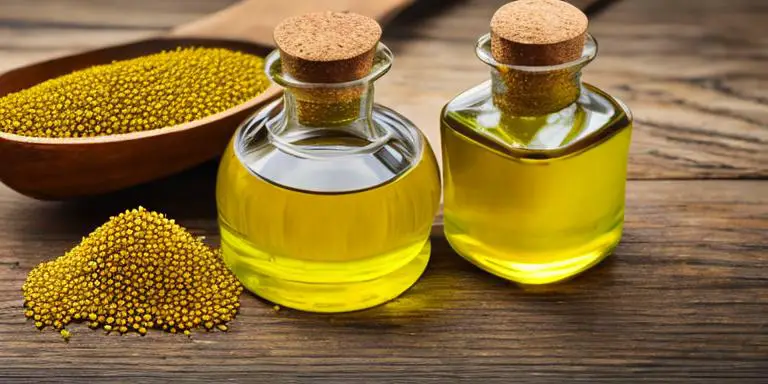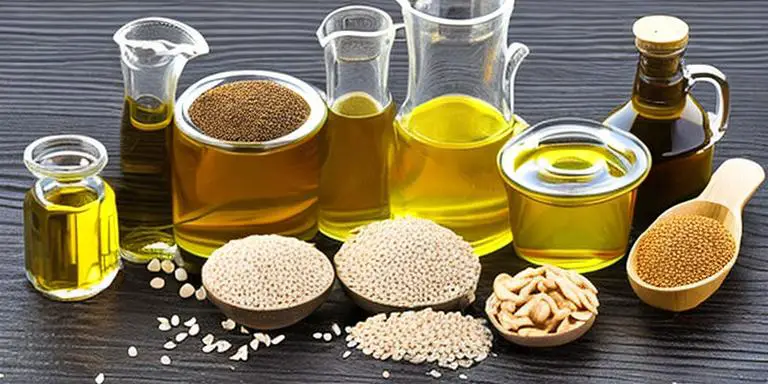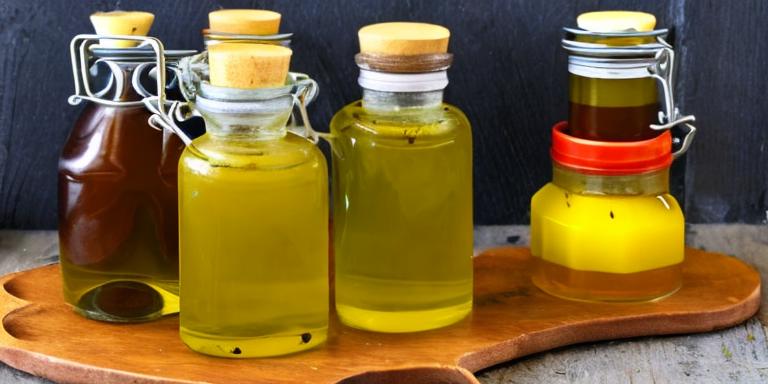Mustard oil is popular cooking oil in Indian cuisines. It has a strong flavor, a pungent smell, and a high smoking point. Its taste and smell might not be a darling to everyone, and some might also be allergic to it. So, are there any substitutes for mustard oil?
Yes! Mustard oil has great substitutes that you can use if you’ve either run out of it or are allergic to it. Other than cooking, mustard oil has been used in the beauty field for hair treatments, skin serum, and massaging oil. This blog post will discuss substitutes that you can use in place of mustard oil.
Let’s get started.
What is mustard oil

Mustard oil is extracted from the seeds of a mustard plant. It comes in two different colors; golden-yellow and reddish-yellow. It has a strong odor that can be detected right away when you open a bottle of mustard oil.
Its taste too, which reminds many people of white vinegar or horseradish sauce, is distinctive. Mustard oil boasts of several vitamins, minerals, and omega-three fatty acids. It also contains monounsaturated fats that help lower cholesterol levels. It is popularly used in cooking and beauty care.
Types of mustard oil
There are two different types of mustard oils: The pressed mustard oil and pungent essential mustard oil.
1. Pressed mustard oil
This oil is more concentrated and has toxic erucic acid. It’s used in cooking in some countries while in others, it has been banned. either way, it’s used in treating the skin and hair.
2. Mustard essential oil
Mustard essential oil is produced from mustard seeds through steam distillation. The distilled oil can be used as a condiment, dressing, and cooking on medium heat. It especially tastes great in salads, stir-fries, chicken, potatoes, and marinades.
12 substitutes for mustard oil

You do not have to worry if you have run out of mustard oil. You can use other great options that perform like the mustard itself. Some good substitutes for mustard oil include:
Sunflower oil
Sunflower oil is one of the best substitutes for mustard oil. It has an almost neutral taste and odor, with a high smoking point. So, you can use it in sautéing or stir-frying just like you would use mustard oil. Sunflower oil can also be used in vinaigrette, homemade mayonnaise, and salad dressings. You can even add seasonings and herbs or even pepper for some spiciness.
Groundnut/peanut oil
This vegetable oil is made from groundnuts or peanuts and has a light yellow color with a mild nutty taste. This oil has a high smoking point, ideal stir-frying or sautéing as well. Its rich nutty flavor and aroma are perfect in marinades and dressings.
Sesame oil
Sesame oil is another excellent substitute for mustard oil and is popular in Asian cuisine. It has an intense flavor that varies on the condition of the seeds- whether or not they are roasted.
The smoking point of sesame oil is quite high, and its color varies from dark to light. Darker-colored sesame oil has a bold and robust flavor, and lighter-colored sesame oil means it has a subtle flavor.
Coconut oil
Coconut oil has a mild flavor and aroma. It is best when added to savory dishes or used in baking.
Olive oil
Olive oil is made from crushed olives. It can either be extra virgin or refined. The extra virgin oil is produced by cold-pressing olives without chemicals or heat. This virgin oil has a fruity and bitter taste and a pungent aroma.
On the other hand, refined olive oil is chemically treated to neutralize the robust flavors and has an almost tasteless flavor. The most preferred olive oil version is the extra virgin oil, as it has a higher smoking point than the refined one, which has a low smoking point.
Balsamic vinegar
Balsamic vinegar has a deep mustard oil profile with a strong flavor and aroma that can be used in glazing foods. You can use it to glaze Brussels sprouts in the oven. Balsamic vinegar is the best choice for salad dressings and condiments for foods.
Rice bran oil
Rice bran oil is made from rice bran and can be used in cooking and salad dressing. It is a healthy substitute with a light flavor and smell. Its high smoking point of 4500Fmakes it ideal for sautéing.
Horseradish powder
Horseradish and mustard belong to the same plant family. It has a hot, sour, and spicy flavor that can add zing to your food, unlike mustard oil. You can use it in dips, dressings, sauces, or even sprinkle it over your food. Just make sure to use caution when adding this powder, as it can be pretty potent.
Ginger
Ginger is as pungent as mustard oil with a peppery taste that gives food some uniqueness. The good thing about ginger is that it is versatile and can be added to beverages, rubs, and baked goods. Since this ingredient is relatively concentrated than mustard oil, 1/8th to ¼ teaspoon should substitute a tablespoon of ginger.
Mustard paste
Mustard pasteincludes ground mustard seeds, salt, vinegar, and chili. It has a bold and robust aroma that makes it an excellent substitute for mustard oil, but you’ll have to use only half the amount recommended for the oil.
Make some mustard paste by combining ½ teaspoon of mustard powder and ¼ cup of hot water. The temperature of water used will determine how sharp the paste’s flavor will be.
Ground Mustard
Do you want the mustard flavor in your dishes? This ground mustard is a super alternative to achieve that. Ground mustard can either be dark brown or white mustard seeds ground to form a strong mustard powder. Incorporate the strong aroma and bitter mustard flavor in your foods.
Wasabi
Wasabi is a Japanese horseradish that has a hot and intense flavor. Its powder is often used as a condiment for sushi but can also be added to sauces, dressings, or dips. Wasabi oil includes olive, canola oil, soy, and wasabi extract, giving it a sweet and hot flavor.
Like ginger, wasabi is quite concentrated, so you only need to use about ¼ teaspoon to substitute for one tablespoon of wasabi.
Homemade mustard oil

Did you know that you can make your own mustard oil in your kitchen? Here is what you will need:
Ingredients
- ½ cup mustard seeds
- ¼ cup vinegar
- ¼ cup water
- ½ teaspoon salt
- ½ teaspoon
- Sugar
- Pinch of ground turmeric
Direction:
- Roast the mustard seeds on low heat until they pop in a pan.
- Then, add the vinegar and water and bring it to a boil.
- Turn off the heat and let it cool.
- Strain the mixture using a fine-mesh strainer and add salt, sugar, and ground turmeric.
- Store in an airtight container in the fridge for up to two weeks.
Choosing a mustard oil substitute
When choosing a substitute for mustard oil, it’s necessary to have some crucial considerations in the back of your mind. So what should you consider?
- Flavor
You will want to go for substitutes that will complement the mustard flavor in your foods. Mustard paste and powder are great substitutes because of their similarities to mustard oil.
- Heat
Ginger and horseradish powder will be ideal for the heat effect if you want a hot flavor. If you’re not looking for heat, then avoid them.
- Use in recipes
If it’s used as a condiment, choose one that is easily added to your recipes. Powders and pastes are easy to work with, while oils might be a little more complicated.
- Storage
Mustard oil has a long shelf life, but its substitutes might not last as long. Choose one that can be refrigerated or frozen.
- Smoking point
The smoking point is the temperature at which a cooking fat or oil starts to break down and produce harmful compounds. Going for substitutes with a high smoking point is ideal, as they’re better suited for high-heat cooking.
- Quality
You’ll want to go for high-quality substitutes because they have the best flavor. Quality oil like olive oil, rice bran, sesame oil, peanut oil, and sunflower oil are great substitutes.
Recipe ideas
Mustard oil is used in cooking, baking, and even condiment or flavoring agents. Here is an example of a recipe you can use mustard oil in:
Mustard shrimp
Ingredients
- 1 tbsp. olive oil
- 1 tbsp. rice vinegar
- 1 tbsp. mustard paste
- 1 tsp honey
- 1 tsp smoked paprika
- salt and pepper to taste
- 500g large shrimp, peeled and deveined
Directions:
- Heat olive oil in a pan over medium-high heat.
- Add the shrimp, vinegar, Dijon mustard, honey, smoked paprika, salt, and pepper.
- Cook for about three minutes or until the shrimp turn pink.
- Remove from heat and serve immediately.
Video: Benefits and uses of Mustard Oil
Frequently asked questions
Is mustard oil banned in some countries? If so, why?
Mustard oil is banned for culinary purposes like in some countries like USA and Canada. It has also been restricted for use in infant food because it contains erucic acid, harmful in high doses. It’s also a potential allergen.
Is mustard oil good?
Yes! Mustard oil is quite healthy and can be used in various recipes. It’s similar to olive oil but has distinct features that make it super good.
How do you store mustard oil?
Mustard oil can be stored at room temperature for up to one month or refrigerated for six months. It can also be frozen for up to a year.
Can I use other oils in place of mustard oil?
Yes, you can use other oils in place of mustard oil, but you must consider the flavor and heat profile of the substitute oil. Choose one that will complement the flavors in your dishes.
Final words
Mustard oil is a flavorful and healthy cooking oil with various uses. When choosing a substitute, it’s essential to consider the flavor, heat profile, and how well it will work in your recipes. There are many great substitutes for mustard oil available, so you’re sure to find one that fits your needs.
